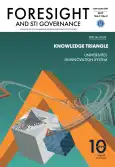The Effect of Talent Management Process on the Research Performance of Faculty Members with the Mediating Role of Organizational Justice
- Авторлар: Eghbal F.1, Hoveida R.1, Seyadat S.A.1, Samavatyan H.1, Yarmokhammadian M.2
-
Мекемелер:
- University of Isfahan
- Isfahan University of Medical Sciences
- Шығарылым: Том 11, № 2 (2017): VOL 11, NO2 (2017)
- Беттер: 83-91
- Бөлім: MASTER CLASS
- URL: https://bakhtiniada.ru/1995-459X/article/view/350318
- DOI: https://doi.org/10.17323/2500-2597.2017.2.83.91
- ID: 350318
Дәйексөз келтіру
Аннотация
For the sample size, using the SPSS Sample Power software, out of 562 individuals, 130 were selected using stratified random sampling proportional to sample size. For data collection, faculty members’ research performance record, a talent management questionnaire and a perceived organizational justice questionnaire were used. Convergent validity for both questionnaires (AVE) was calculated to be more than 0.5 and the reliability of both questionnaires using Cronbach’s alpha coefficient was calculated to be more than 0.75. Data analysis was performed using the Smart PLS 3.2.6 statistical software.
Findings indicated that the components of the variables of perceived talent management and perceived organizational justice constitute a total of 61% of the variance of the variable of research performance and the mediating role of the variable of perceived organizational justice was calculated to be insignificant. As a result, it can be said that improvement of talent management process components can lead to increased faculty members’ perceived organizational justice and ultimately improved research performance.
Авторлар туралы
Farzaneh Eghbal
University of Isfahan
Email: f.eghbal.ui.ac.ir@gmail.com
Isfahan Province, Isfahan, P.O. Box 146, Daneshgah Street, Isfahan, 81746-73441, Iran
Reza Hoveida
University of Isfahan
Email: r.hoveida@edu.ui.ac.ir
Isfahan Province, Isfahan, P.O. Box 146, Daneshgah Street, Isfahan, 81746-73441, Iran
Seyed Seyadat
University of Isfahan
Email: s.a.siadat@edu.ui.ac.ir
Isfahan Province, Isfahan, P.O. Box 146, Daneshgah Street, Isfahan, 81746-73441, Iran
Hossein Samavatyan
University of Isfahan
Email: h.samavatian@edu.ui.ac.ir
Isfahan Province, Isfahan, P.O. Box 146, Daneshgah Street, Isfahan, 81746-73441, Iran
Mokhammad-Khosseyn Yarmokhammadian
Isfahan University of Medical Sciences
Email: mhyarm@yahoo.com
P.O. Box 319, Hezar-Jerib Ave., Isfahan 81746 73461, Iran
Әдебиет тізімі
- Adams J.S. (1963) Toward an understanding of inequity // Journal of Abnormal and Social Psychology. Vol. 67. P. 422-436.
- Avital M., Collopy F. (2001) Assessing Research Performance: Implications for Selection and Motivation. Sprouts Working Papers on Information Systems, 1(14). Cleveland, OH: Case Western Reserve University, USA. Режим доступа:http://sprouts.aisnet.org/1-14, дата обращения 26.10.2016.
- Badri A.M., Abdulla H. (2004) Award of excellence in institutions of higher education: An AHP approach // Journal of Educational Management. Vol. 78. № 4. Р. 224-242.
- Cheese B., Thomas R., Craig E. (2008) The Talent Powered Organization: Strategies for Globalization, Talent Management and High Performance. London: Konan Page.
- Eghbal F., Hoveida R., Siadat S.A., Samavatian H., Yarmohammadian M.H. (2016) Designing and codifying the faculty members' talent management process model for talent-based universities // Journal of General Management Research. Vol. 22. P. 9-11.
- Gelens J., Hofmans J., Dries N., Pepermans L. (2014) Talent management and organisational justice: Employee reactions to high potential identification // Human Resource Management Journal. Vol. 24. № 2. Р. 159-175. DOI:https://doi.org/10.1111/1748-8583.12029
- Gething L., Larthaepin B. (2000) Strategies for promoting research participation among employed academics in the university sector // Nurse Educe Today. Vol. 20. № 7. P. 147-156.
- Huselid M.A., Beatty R., Becke B.E. (2010) A Player or a Positions? The Strategic Logic of Workforce Management // Harvard Business Review. Vol. 13. № 4. Р. 110-116.
- Jiang T.T., Iles P. (2011) Employer-brand Equity, Organisational Attractiveness and Talent Management in the Zhejiang Private Sector, China // Journal of Technology Management. Vol. 6. № 1. P. 97-110.
- Kagwiria R. (2013) Role of Talent Management on Organization Performance in Companies Listed in Naibobi Security Exchange in Kenya: Literature Review // International Journal of Humanities and Social Science. Vol. 3. № 2. P. 285-290.
- Lambert E. (2003) The impact of organizational justice on correctional staff // Journal of Criminal Justice. Vol. 31. № 2. P. 155-168.
- Levin S.G., Stephan P.E. (1991) Research productivity over the life cycle. Evidence for academic scientists // The American Economic Review. Vol. 81. № 1. P. 114-132.
- McDowal A., Fletcher C. (2004) Employeed development: An organizatinal justice perspective // Personnel Review. Vol. 33. № 1. P. 8-18.
- McNabb N.S. (2009) The daily floggings will continue until morale improves: An examination of the relationships among organizational justice, job satisfaction, organizational commitment and intention to turnover (PhD Thesis). Norman, OK: University of Oklahoma.
- Niehoff B.P., Moorman R.H. (1993) Justice as a mediator of the relationship between methods of monitoring and organizational citizenship behavior // Academy of Management Journal. Vol. 36. № 3. Р. 527-556.
- Ramsden P. (1994) Describing and explaining research productivity // Journal of Higher Education. Vol. 28. № 6. Р. 207-226.
- Rezaian A., Soltani F. (2009) Introduction to a comprehensive and systematic talent management model for the improvement of the individual performance of the oil industry's employees // Journal of Human Resource Management in the Oil Industry. Vol. 3. № 8. P. 49-55.
- Salehzadeh L., Labaf H. (2011) Developing a model for strategic talent management for improvement of organizational performance // Journal of Tadbir. № 192. P. 32-41.
- Sayadi S., Mohammadi M., Nikpour A. (2011) Talent management - A key concept in the field of human resources // Journal of Work and Society. № 135. P. 81-86.
- Sweem S.L. (2009) Leveraging employee engagement through a talent management strategy: Optimizing human capital through human resources and organization development strategy a field study (PhD Thesis). Lisle, IL: Benedictine University.
- Zainab A.N. (2000) Publication productivity, focus on institutional, collaborative and communicational correlates: A review of literature // Mаlaysian Journal of Library and Information Science. Vol. 5. № 1. P. 53-94.
Қосымша файлдар








